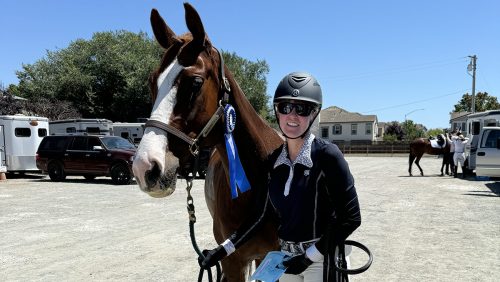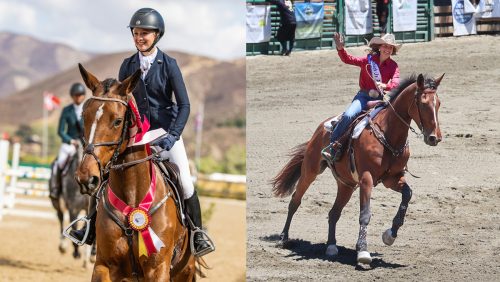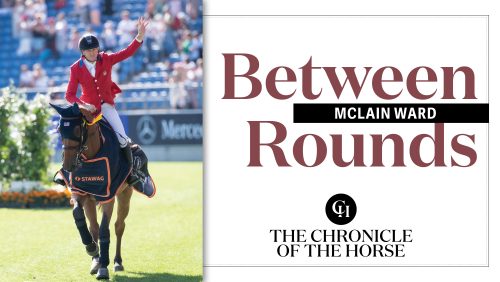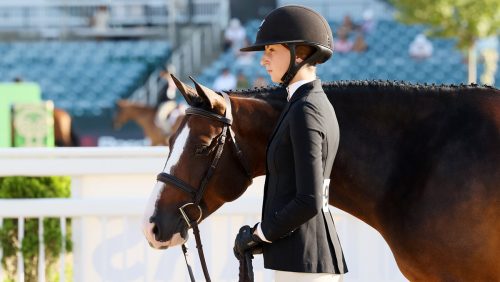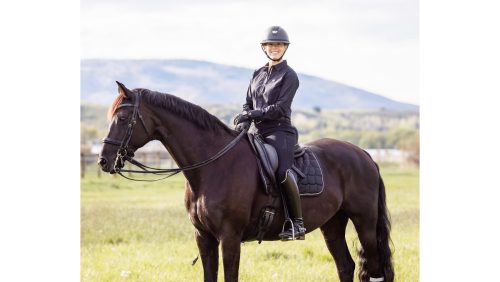Riders who put in long hours at the barn or on the road competing would likely say it isn’t all about the horses—they also invest in bonds with other riders, parents, grooms and coaches. To strengthen boundaries and safeguard athletes, the Fédération Equestre Internationale has partnered with #WeRideTogether, a U.S.-based nonprofit with a mission to prevent sexual misconduct in sports, to create a free online safeguarding training course available to FEI members and non-members alike.
Michaela Callie, executive director of #WeRideTogether and co-author of the course, says that the physical and emotional dedication of athletes to their riding is part of the appeal of horse sports. But that strength is also its vulnerability: An equestrian’s all-in dedication can lead to blurred boundaries, which can lead to violations of those boundaries.
Callie wanted to create a resource that would be accessible to everyone. Both elite riders and backyard lesson programs, need guidance to make a safe barn culture, she said. The course is posted online at FEI Campus, though people need not be FEI members to access it.

“If they’re not an FEI rider, or they’re not a part of an FEI barn, they can still access really important resources and education that can then be adapted into their athletic space,” Callie said.
Callie and co-author, Kathryn McClain, #WeRideTogether’s programs and partnerships director, have designed the course to be a resource that riders, parents, grooms, coaches and show organizers can utilize to proactively prevent abusive dynamics in their programs.
“Kathryn has a [masters of social work], so she’s bringing that lens as well, [being] someone who used to work in the social work field,” Callie said. “So it’s really bringing in the athlete-informed, the survivor-informed, the trauma-informed and the research-informed lens. Because our team has been able to have this boots-on-the-ground approach to safeguarding, we’ve been able to basically serve as translators of all this amazing research that’s out there and information that we’ve gathered as an organization, and then packaged it and translated it to communities that need this content simplified and tangible.”
The training uses videos styled similarly to public service announcements, interactive quizzes, and printable resources like the “active bystander toolkit,” which barns can keep on hand as a practical resource to keep community safeguards accessible.
ADVERTISEMENT
As is noted in the training, “Unfortunately, the reality is that more than 50% of athletes experience abuse in sports, and 90% of victims know their abuser.” Considering the pervasiveness of abuse, Callie and McClain designed the course to help athletes understand the line between a competitive atmosphere and an abusive atmosphere.
A trainer can have high expectations of riders without abusing their power, Callie said. The course helps athletes understand when those with authority might be veiling misconduct under the guise of rigor, discipline or expertise.
#WeRideTogether also offers materials that can be displayed in the barn or the show tent. Callie hopes to see conversations about safeguarding normalized by practices like hanging a healthy relationship diagram beside a sign that says, “Wear a helmet.” Both promote safety, but currently, one is more taboo than the other.
“What we found is, by having this visual and giving people actual language to put to these experiences, it helps people discern, ‘Am I experiencing tough coaching, or is this starting to blur a boundary and kind of verge into abusive behavior or behavior that’s unacceptable for me?’ ” Callie said. “Because I think sometimes here in sport, it’s, ‘Oh, that’s just the way it’s always been,’ or, you know, ‘That’s just how that coach is.’ But we need to be able to educate people on how to create those healthy boundaries and those healthy relationship dynamics.”

Callie hopes to teach users that effective coaching thrives on safe, healthy dynamics and that fostering a safe barn culture actually improves performance.
“The culture of sport should be one that puts morals over medals, or I guess in this case, riders over ribbons, right?” Callie said. “If we invest in the well being of our athletes and increase that accountability and that transparency and that education in our sport, which is what the course is all about, [we’re] able to protect the integrity of sport and improve sustainable participation.”
For Callie, teaming up with a governing body like FEI symbolizes the sort of culture-wide shift that #WeRideTogether hopes to see across youth sports.
ADVERTISEMENT
“Organizations—especially international federations, which is what FEI is—they’re really responsible for setting the tone at the top, so to speak,” Callie said.
“I think it’s really important to note that people and policy are inherently interconnected, and so this course is building on interpersonal skills that are needed in order for policies to be effective in the first place,” she continued. “And additionally, policies need to be informed by the stakeholders that they serve.”
The program, which launched April 1 on the FEI website, is the culmination of a year of research, focus groups and outreach to top riders who participated in the training videos, including Olympic show jumpers Tiffany Foster and Amy Millar.
“At the FEI, we believe it’s essential to keep the conversation going about safeguarding and the importance of creating a safe, healthy environment for all participants in equestrian sport,” said FEI legal director Mikael Rentsch in a press release.
“Safeguarding isn’t just about policies,” he continued. “It’s about fostering a culture of respect, awareness and accountability, and our goal is to give the equestrian community the tools and knowledge to recognise risks and take preventive action because we all have a role to play.”






